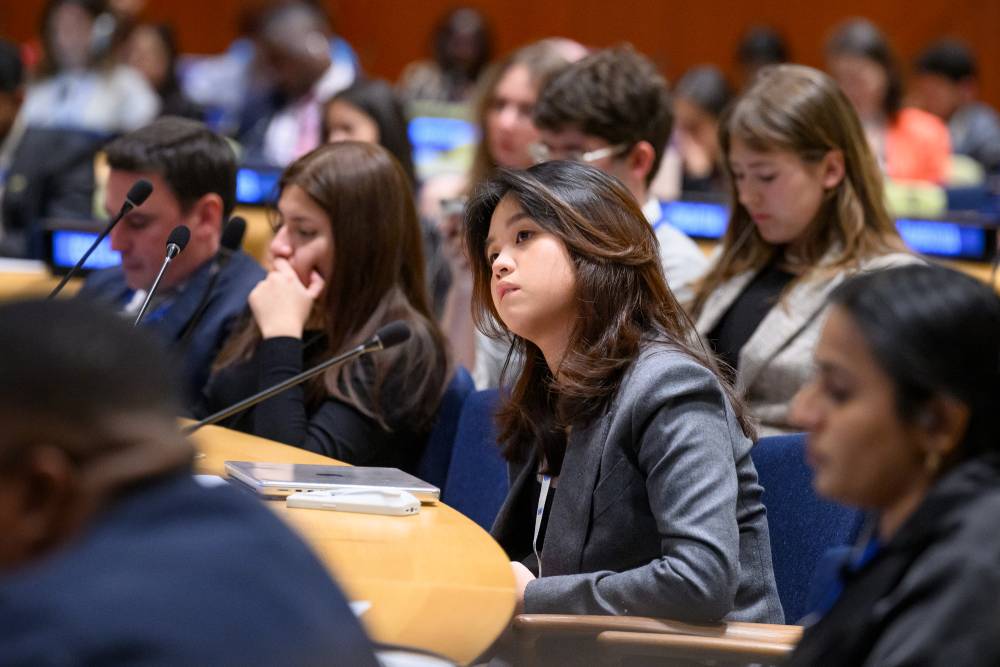This year marks a decade since the adoption of the landmark United Nations Security Council Resolution 2250 on Youth, Peace and Security (YPS). The YPS Agenda recognizes the detrimental effect of marginalizing youth and calls for ensuring inclusive representation, taking their views into account and empowering them in peacebuilding and conflict resolution. It also encourages those involved in the planning of disarmament, demobilization and reintegration to consider the needs of youth affected by armed conflict, including investing in building the capabilities and skills of young people, as well as evidence-based and gender-sensitive youth employment opportunities.
The past ten years have seen the development of a growing international architecture around Youth, Peace and Security, which has helped to elevate the role of young people in building and sustaining peace. This has encouraged their participation in political processes, peacebuilding initiatives, and disarmament dialogues. However, despite this progress, significant challenges persist. Structural barriers continue to hinder the meaningful inclusion of young people, and their voices are still underrepresented in policymaking and peace and security processes. As a result, the vision of the YPS Agenda has not yet been fully realized.
UNIDIR is committed to change that and to create conditions that allow young people around the world to progress and play an active role in shaping decisions related to peace and security. Through our Graduate Professional Programme, we are actively promoting youth inclusion, by building disarmament research capacity among the next generation. In a world where half the population is under 30 years old (and where this figure is projected to rise to 57% by 2030), the full and effective engagement of young people is not just a demographic reality but a political and security imperative.
Last August, UNIDIR launched the Youth and Disarmament Hub, which serves as a gateway to youth-led and youth-empowering initiatives in disarmament, arms control and non-proliferation. One of its key features are the Youth Visions of Peace campaign empowering young people to share their messages of hope for a more peaceful future, and the Youth Disarmament Orientation Course – a self-paced course, structured around main topics of international security, such as nuclear weapons, small arms and AI.
Expanding the Youth Disarmament Orientation Course
In 2025, UNIDIR is expanding the course and launching two new modules.
This module explores the Women, Peace and Security Agenda and its relevance for arms control and disarmament. It highlights the gendered impacts of weapons and armed violence, the barriers women face in participating in peace and security processes, and the importance of applying gender perspectives in disarmament work, including through the use of new technologies. The module also offers concrete examples of how gender-responsive approaches can lead to more inclusive and effective policy outcomes.
This module introduces the Youth, Peace and Security Agenda in the context of disarmament and arms control. It examines how young people are affected by armed violence and explores their diverse contributions to peacebuilding and disarmament advocacy. Emphasizing youth agency and diversity, the module encourages learners to rethink traditional narratives around youth in peace and security, while exploring the steps taken by the international community to advance youth inclusion in international affairs.
Voices from the next generation
UNIDIR hopes this course will inspire the new generation to get involved in arms control, non-proliferation and disarmament.
Young people have the ability to challenge inertia and envision futures beyond entrenched divides
Dr Victoria Guimaraes, Graduate Professional
One of the most important contributions of youth is their creativity in envisaging how we can face tomorrow’s challenges – innovative thinking around peace and security is needed now more than ever.
Desiré Raagart, Graduate Professional
In a context of rising instability, armed conflicts and climate crisis, young people are key actors in building more peaceful and secure societies. Whether it is through grassroots organizing, transnational networks, intergenerational collaboration or knowledge production and advocacy, youth are actively shaping the future of international security. This is something UNIDIR’s Graduate Professional sees in the research projects in which he is involved as part of the Managing Exits from Armed Conflicts team.
In Colombia, Iraq and Nigeria, our participatory research shows that when young people are given the space to lead, they are no longer seen as risks. Instead, they are recognized as the drivers of sustainable peace.
Amos Benjamin, Graduate Professional
UNIDIR would like to thank the Republic of Korea for its generous support towards the Institute’s youth engagement activities.
